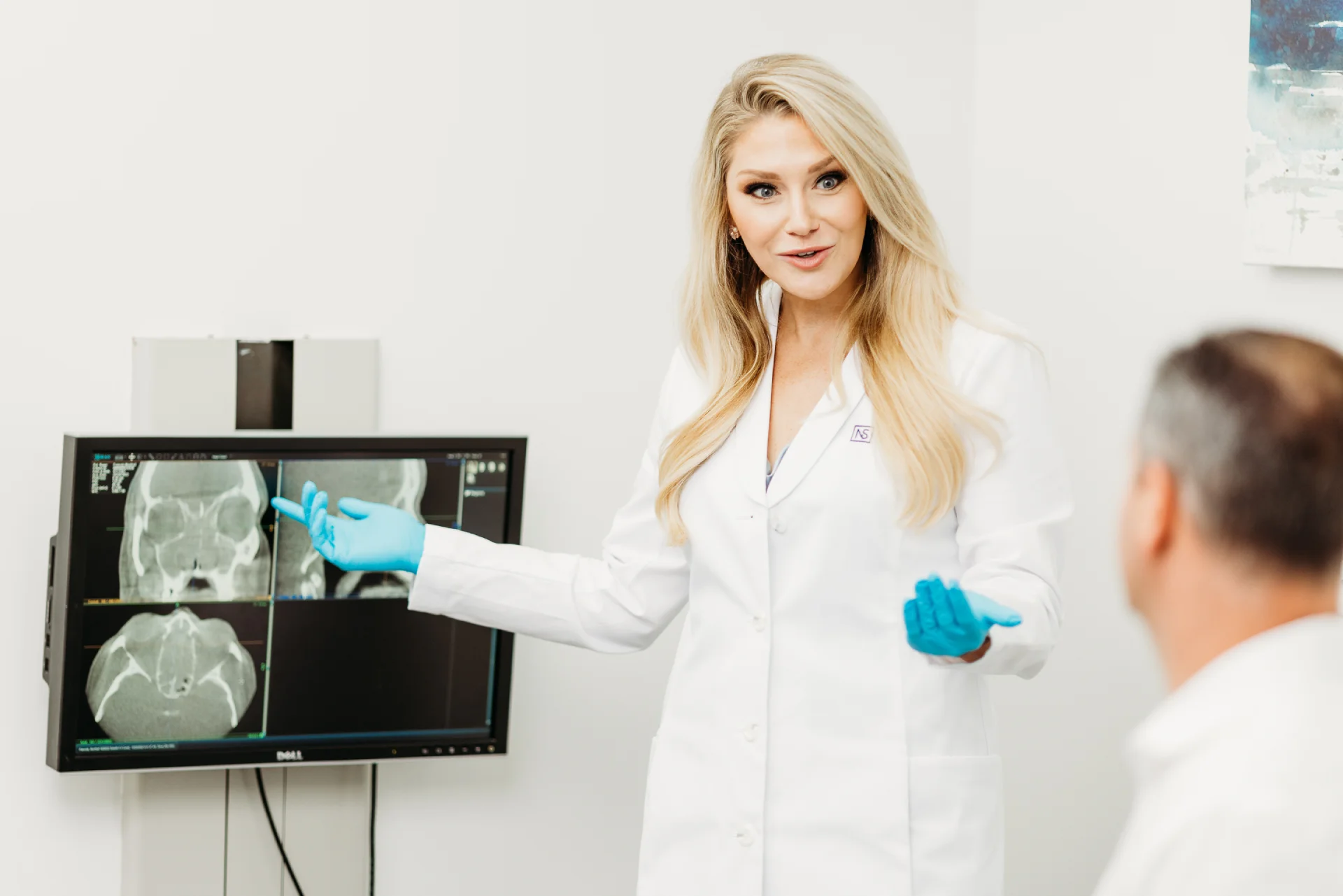
NSIBR |Procedures, Rhinoplasty | November 12, 2024
Are you experiencing ongoing nasal congestion, postnasal drip, or sinus pressure due to rhinitis or sinusitis? We know how the discomfort from these conditions can feel never-ending, often interfering with your ability to breathe, sleep, or simply go about your day. While rhinitis and sinusitis share some common symptoms, they are distinct conditions with different causes and treatments. Knowing which one you’re dealing with is key to finding effective relief, especially for those suffering from chronic cases.
In this post, we’ll break down both conditions, explain how they are related, and offer insight into treatment options for those in Boca Raton seeking relief.
Understanding Rhinitis
Rhinitis is the inflammation of the nasal mucous membrane, causing symptoms like sneezing, nasal congestion, runny nose, and itching. When associated with a viral illness such as a cold, it is known as acute rhinitis. When it is associated with allergies and persists long term (by definition longer than three months) it is referred to as chronic rhinitis. It can present in two forms. Allergic rhinitis, or hay fever, follows predictable patterns—either seasonal or year-round. Non-allergic rhinitis, on the other hand, involves more constant symptoms. Acute rhinitis, often following a viral infection, can bring more severe symptoms such as intense congestion, heavy nasal discharge, and significant facial discomfort. These symptoms usually resolve quickly, but chronic rhinitis involves persistent discomfort that lasts longer.
What Cause Rhinitis
The condition can be caused by various factors, including allergens like pollen and dust for allergic rhinitis, and irritants such as smoke and strong odors for non-allergic rhinitis. Additionally, viral infections can trigger acute rhinitis.
Understanding Sinusitis
Sinusitis occurs when the sinuses, air-filled spaces around your nose and eyes, become blocked and inflamed. Acute sinusitis presents with short-term symptoms, typically lasting less than four weeks, while chronic sinusitis extends beyond 12 weeks and is more persistent. Common signs include facial pain or pressure, nasal congestion, and thick, discolored mucus. Other symptoms often involve postnasal drip, reduced sense of smell, and difficulty breathing through the nose. Chronic cases may also be accompanied by fatigue and frequent sinus headaches.
What Cause Sinusitis
The condition can be caused by several factors, including viral infections, bacterial infections, allergies, and irritants like smoke or pollution. Structural issues, such as a deviated septum or nasal polyps, may also contribute to sinusitis development.
How Do the Rhinitis vs Sinusitis Symptoms Compare?
Many people confuse rhinitis and sinusitis due to overlapping symptoms. However, distinct characteristics can help differentiate them. Rhinitis usually presents with milder, more transient symptoms, while sinusitis often involves more severe, prolonged symptoms with specific attributes.
| Comparison | Rhinitis | Sinusitis |
|---|---|---|
| Onset and Duration | Symptoms appear quickly and can last for varying durations, often linked to allergens. | Symptoms develop gradually and can persist for weeks. |
| Mucus Color | Typically clear mucus. | Thick and discolored mucus, indicating infection. |
| Symptoms |
|
|
Can You Have Both Sinusitis and Rhinitis?
Yes, it is possible to have both sinusitis and rhinitis simultaneously, a condition referred to as rhinosinusitis. When the nasal passages are inflamed (rhinitis), they can block the drainage of the sinuses, leading to sinusitis. Treating both conditions simultaneously is often necessary to fully alleviate symptoms and restore normal breathing.
When to See a Doctor
If your symptoms of rhinitis or sinusitis persist beyond 10 days, or if you frequently suffer from these conditions, it’s essential to seek medical attention. Chronic inflammation can lead to more severe complications, including infections that spread to the eyes, and in rare cases, to the brain. It may even cause irreversible damage to the nasal tissues.
At the Nose and Sinus Institute of Boca Raton (NSIBR), our specialists can help diagnose and treat both rhinitis and sinusitis using advanced techniques. Whether you’re dealing with seasonal allergies, chronic congestion, or sinus pain, we have the expertise to provide effective relief.
Treating Rhinitis vs Sinusitis: What Are Your Options?
The treatments for rhinitis and sinusitis differ mainly in their approach.
Rhinitis Treatment at NSIBR
Our treatment includes medical and surgical nasal drainage to clear blockages, balloon sinuplasty to widen sinus openings, the Total Nose Approach™ for functional and aesthetic improvements, endoscopic surgery for targeted relief, and various medications like antihistamines and nasal corticosteroids to manage symptoms. In contrast, sinusitis treatment often focuses on antibiotics for infections, nasal corticosteroids to reduce inflammation, and, in chronic cases, surgical options to enhance sinus drainage.
Sinusitis Treatment at NSIBR
We offer a variety of effective treatments for sinusitis tailored to individual patient needs. Our endoscopic sinus surgery is a minimally invasive procedure utilizing a small camera to clear blockages and improve sinus drainage, allowing for faster recovery with minimal scarring. The balloon sinuplasty procedure involves inserting a small balloon into the sinus passages and inflating it to expand the pathways, which reduces blockages and enhances breathing.
For those with both sinusitis symptoms and cosmetic concerns, our Total Nose Approach™ addresses functional and aesthetic issues, improving nasal airflow while enhancing the overall appearance of the nose. Additionally, we provide medical-grade medications, such as corticosteroids for inflammation and antibiotics for bacterial infections.
Let’s Talk Nose and Sinus Conditions
If you’re experiencing symptoms of rhinitis or sinusitis, don’t hesitate to book a consultation. Our team at NSIBR is here to help you find effective treatment solutions tailored to your needs. Contact us today to schedule your appointment!



